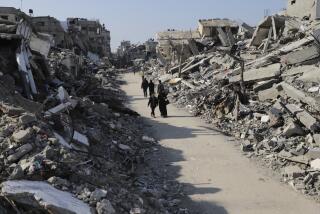Kidnappings, shelling roil Iraqi capital
- Share via
baghdad -- Mortar shells killed at least 12 Iraqi civilians here, and gunmen kidnapped 15 people from a bus outside a busy downtown shopping center Sunday, as U.S. troops struggling to pacify the capital clashed with suspected insurgents.
The daylight violence in Baghdad occurred as Prime Minister Nouri Maliki met with rival political factions for a fourth day in an attempt to mend sectarian rifts that have paralyzed his government. Commanders of the U.S.-led counterinsurgency complain that their success depends in part on having a functioning Iraqi leadership to reinforce security gains.
Politicians cited some progress in setting an agenda for reconciliation talks this week. Maliki’s office, meanwhile, announced that he would be leaving with several Cabinet members today for a three-day visit to Syria.
The Iraqi leadership is under pressure from Washington to make greater progress on meeting 18 benchmarks that would show self-reliance. Without a functioning central government to provide supplies and guidance, advances in Iraqi-U.S. security teamwork in provincial communities are at risk of collapsing, U.S. generals say.
As the focus of stepped-up U.S. operations to flush out insurgents and disrupt their bomb-making, Baghdad had been experiencing periods of relative calm in recent weeks. But Sunday, a series of violent clashes erupted in eastern neighborhoods.
Five mortar shells crashed into the Ubaidi neighborhood in east Baghdad just before noon, killing 12 people and injuring at least 31 others. Four women and two children were among the dead.
A motorcycle bomb had exploded in the same area an hour earlier, killing one civilian. Another Iraqi died when an improvised explosive device detonated there.
An Iraqi policeman was killed by an explosion in east Baghdad after nightfall, his precinct reported. Gunmen shot and killed a senior Education Ministry official, Hameed Muhsin, and his brother in the backyard of their home in east Baghdad, police reported.
As the mortar rounds fell in Ubaidi, U.S. and Iraqi forces nearby fought with Shiite Muslim militiamen loyal to anti-American cleric Muqtada Sadr. The joint forces targeting sectarian violence were moving against Sadr’s radical Al Mahdi militia when the blasts occurred.
“Our neighborhood is always targeted, either by the gunmen or sometimes by the American troops,” lamented Basem Sadoon, a 34-year-old laborer in Ubaidi. He said he helped evacuate the injured and watched helplessly as an elderly woman bled to death.
The 14 passengers and minibus driver abducted outside the Mustansiriya Shopping Center in midafternoon were believed to be Shiites. The bus was headed for the Sadr City slum, an Al Mahdi militia stronghold home to 2.5 million people, mostly Shiites. Sectarian kidnappings rarely result in negotiations for captives’ release, and the bus occupants were expected to turn up among the dozens of corpses found by police each morning -- evidence of executions by rival Shiite and Sunni death squads.
The joint operation in the capital was launched last week as part of a series of counterinsurgency missions making use of 28,500 additional U.S. troops deployed to Iraq in recent months in an effort to show progress in stabilizing the country after more than four years of war.
The operations have also targeted Sunni Arab militants believed to be behind violence against Shiites such as the shopping center abductions.
Army Maj. Gen. Rick Lynch, who commands more than 12,000 troops over a broad area of southeastern Iraq, said there had been an increase in attacks involving weapons linked to Iran in his area of operation, contributing to the deaths of 71 U.S. troops in the last 60 days.
“The enemy is indeed now more aggressive,” Lynch said. “He’s more effective because he’s using more effective munitions, all of which seem to be supplied by Iran.”
Iran has denied U.S. allegations that it arms and trains Shiite militias.
Lynch said that intelligence indicated there were 50 members of Iran’s Revolutionary Guard in his area of operation.
“We know they’re here. They’re facilitating training for Shiite extremists. And we know there are Shiite extremists going into Iran, getting trained and coming back,” he said.
Sunday was the fourth anniversary of the deadly truck bombing that destroyed the United Nations headquarters in Iraq, and to mark the date French Foreign Minister Bernard Kouchner made a surprise visit to Baghdad. He placed a wreath at the site of the blast to honor the memory of the 22 employees of the world body who were killed in the attack.
“Now we are turning the page. We want to talk about the future. Democracy, integrity, sovereignty, national reconciliation and stopping the killings. That’s my big aim,” Kouchner told journalists after his talks with Iraqi leaders during a visit that appeared aimed at easing strains in French-U.S. relations brought on by the war.
Meanwhile, Maliki announced that he and the ministers for the interior, oil, trade and water resources would spend the next three days in Damascus. He had said earlier in the day that he expected the power-sharing summit among Shiite, Kurdish and Sunni leaders to take place “in the next two days.”
Representatives of the three main factions in the government met Sunday for several hours. Vice President Tariq Hashimi, the top Sunni involved in the talks, said the group had made progress on setting an agenda for the yet-to-be-scheduled summit.
U.S. officials such as Ambassador Ryan Crocker and the top military officer in Iraq, Army Gen. David H. Petraeus, have been pressing Maliki’s government to come to agreement on key issues such as national reconciliation, an oil revenue-sharing formula and reconsideration of laws excluding former members of the late Saddam Hussein’s Baath Party from government posts.
--
--
Times staff writer Tina Susman contributed to this report.
More to Read
Sign up for Essential California
The most important California stories and recommendations in your inbox every morning.
You may occasionally receive promotional content from the Los Angeles Times.














